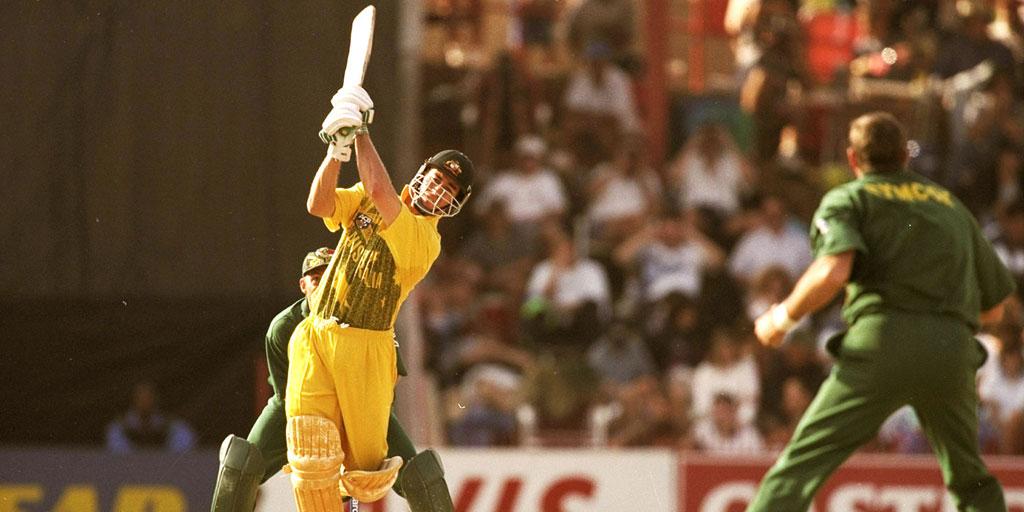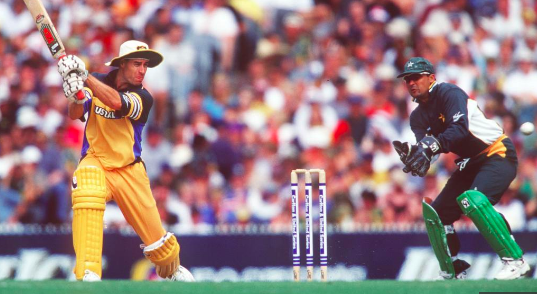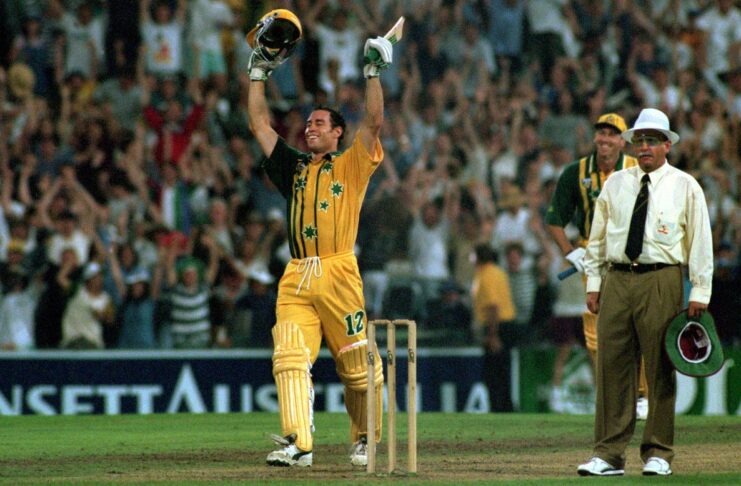Fundamentally, Cricket is the runs scored, balls bowled, wickets taken, at the end of the day.
In that regard, a forever-accompanying habit truth is to refer to statistics while passing judgment on a cricketer.
But is that all?
What about impact?
Not everyone will have big daddy hundreds against their name. Not every name will see the ‘enviable double’ of possessing 10,000 runs in both formats.
But does that mean theirs is a tiny contribution?
Does greater merit also lie in finding out about games won at the back of sheer single-mindedness and resilience?
Is there a greater tale in the way one went about pacing an inning? Can success be defined by how well did an individual held on to an end alone?
There’ll always be cricketers you’d queue up to watch, talents whose mere public appearance can make city streets clogged with endless jams.
Then there will be the likes of Michael Bevan, who’ll make you sit back and appreciate the broader picture of Cricket.
That may be true glory stems from playing for the team’s cause.
That for as long as one is able to change the context of a match at the back of fighting abilities, it doesn’t matter how stylish a batsman is or if his cricket bears a signature of elegance.
From the onset of 1994 to 2004, Michael Bevan signified that Cricket was more than just being about big records and dollops of runs.
And that it was about some rare qualities, at the back of which, teams became big, unbeatable, and undeniable like the elephant in the room.
Part of a star-studded Australia, where big names belittled the existence of others challenging them, Michael Bevan appeared more of a simpleton who gave his all for the team.
He was that man who didn’t have to be mean; the man who believed in the pleasures of quiet humility.
That sort of guy who’d reach the nets first and be the last to depart.
The workhorse like a Kallis! A grinder of the kinds of Chanderpaul!
Very much like his batting that bore a perfect marriage of the keenness to defend during tough situations and the foxiness to accumulate runs when the opposition thought theirs was the game.
And yet here he is, unrelenting like a perplexing enigma.

He doesn’t have a triple hundred against his name. In fact, he doesn’t even have 10 international hundreds in a decade of batting at the top annals.
What Michael Bevan does have, however, are painstaking hours spent in the middle to often repair a broken inning, and that undeniable quality to bat on when others had perished.
Hours that he spent battling pace and spin, braving heat, humidity, and sunburn, often eschewing the desire to stroke but accumulate those 7,500 plus runs.
Never complaining. Always practicing monk-like abstinence from emoting. Imagine, to this day, only a handful among us would probably know what Michael Bevan sounds like while we’ve heard a countless number of times from Ponting, Gilchrist, Warne, McGrath, and Waugh brothers.
His is a case as of a permanent disposition to reticence.
Like how when a game is done and the awards are handed, the hero walks back home- quietly and with grace.
If you are of the opinion that what made Australia the visibly and statistically mighty force throughout the 90s were facets like Glenn McGrath’s disciplined line-and-length, Warne’s mastery at turning it on any track, Hayden and Mark Waugh’s mighty batting or Steve Waugh’s leadership, then perhaps it may not be wrong to place the missing jigsaw in the frame.
Without it, the picture would appear incomplete.
Do not, therefore, forget to be reminded about Michael Bevan’s tireless batting down the lower order that made Australia into the bullies the others saw them as.
Not the most dazzling stroke-maker, yet someone who relied on his ability to hold an inning together, Michael Bevan compromised the style quotient and attached more emphasis to the art of timing.
He was the gap-finder, the strike-rotator.
The man who denied himself the wicked pleasure of mindlessly dancing down the track or flirting with deliveries bowled outside the off.
Batting as if his life depended on his sense of awareness.
For had he done that, how else would he have managed to carry Australia’s hopes?
If you are to truly understand the importance of Michael Bevan and just why he was so utterly irreplaceable in the solid eleven of the 90s, now relished ever more for the strong nostalgia content the past eras offer, rewind back to the 95-96 Benson & Hedges World Series contest against the West Indies.
With Australia needing just 173, he arrived with the scoreboard suggesting a lost cause, the team 4 down for 32.
And then, he batted and batted for nearly 40 overs.
With 11 needed off the final 7 but with Australia holding onto the knife’s edge with just 1 wicket left, it was all up to Michael Bevan, who lifted the final ball of the 49th over for a 4 over mid-wicket.
With 6 needed off 4, he cover-drove Roger Harper to give McGrath a strike.
Was that hara-kiri? Well, not really. McGrath took a single and this meant with 4 needed off 2, Bevan was on strike.
But the penultimate delivery turned into a dot ball.
With 4 needed off 1, the West Indies were in it with Australia limping on the edge.
But as it often happened, one man turned the fate of the inevitable and meant it wasn’t over for as long as he was there.
On the final delivery of that nail-biter at Sydney, Michael Bevan lifted Harper’s off-break straight down the ground for a gun-barrel hit to the fence.
It was game over for West Indies. It brought glory for Australia.
In the must-win 1996 world cup contest against the same opponents, in the sub-continent, Bevan joined forces with Stuart Law to bring back Australia from the dead, after Taylor, Waugh, Ponting had all left the crease.
What seemed an onerous, gut-wrenching task of mending a broken inning, was often every day in the life of Australia’s tireless marathon runner.
Why Bevan will always be relevant?

The man, we sadly often forget, averaged 194 in that ODI series back in Australia during 95-96’ triumph, the man who averaged 64 against an Akram-Waqar-powered Pakistan in Tests, the man who ended his ODI journey at an average of 53.5.
For as long as favoritism will not dictate the mental make-up of the cricket fan referencing the bias that greatness only belonged to a Sachin and Lara or Kallis, a Michael Bevan will seem relevant.
And for as long as Michael Bevan will appear in our cricket-doting psyche, what’ll always matter just as much as runs scored or hundreds struck will be the “not-outs” column.
If the 67 not outs from 196 ODIs do not hint at timeless greatness, then what will?

